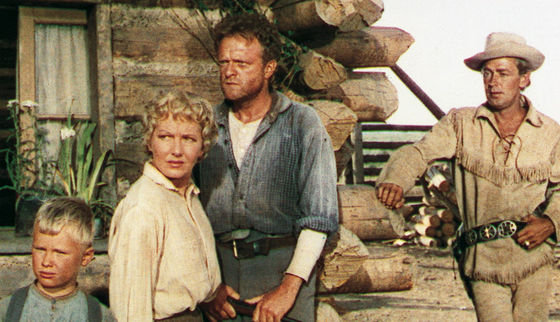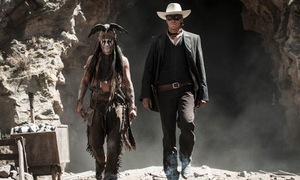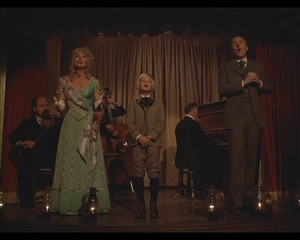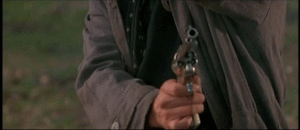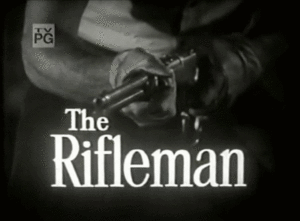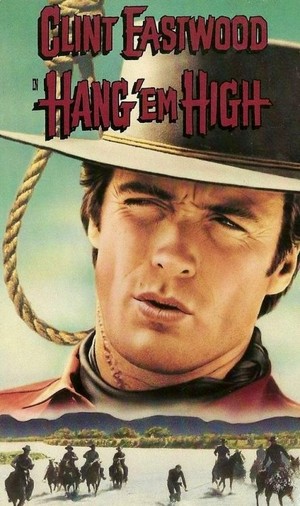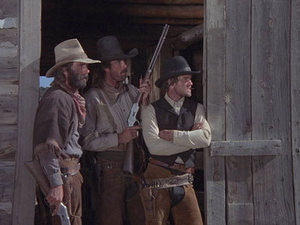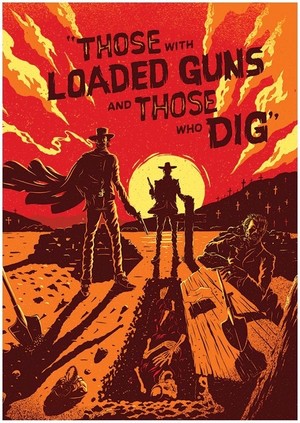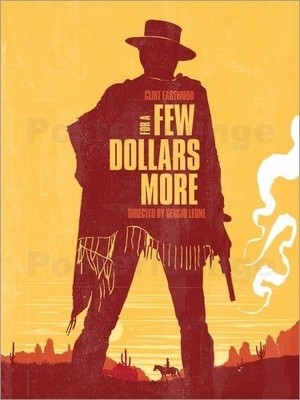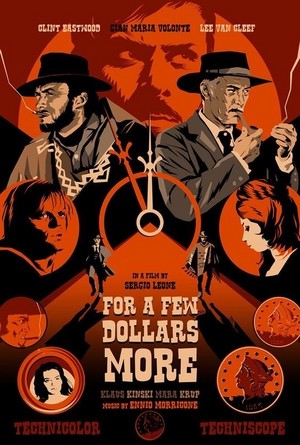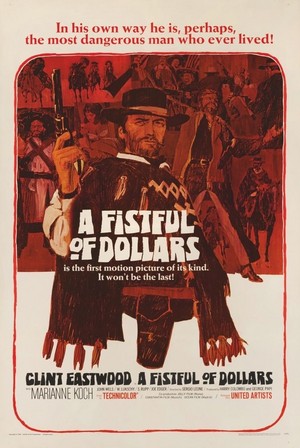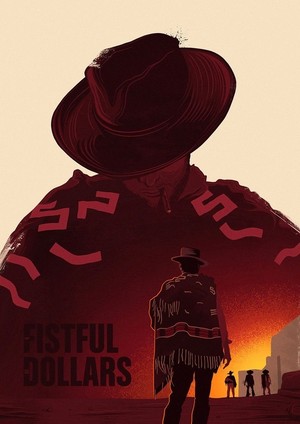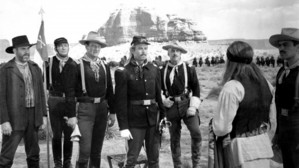"SHANE" (1953) Review
The history behind the production for the 1953 classic Western, "SHANE" is a curious one. At the time, it was one of the most expensive Westerns ever made in Hollywood. And director George Stevens' first choices for the film's two male leads never panned out. Yet, despite the expenses and Stevens' initial bad luck with his casting choices, "SHANE" became one of the most famous Westerns ever made in Hollywood.
"SHANE" was based upon Jack Schaefer's 1949 novel of the same title. Many film historians and critics believe the narrative's basic elements were based upon a historical event, the 1892 Johnson County War. Although this was never acknowledged によって Stevens, Schaefer または the film's screenwriter, A.B. Guthrie Jr. And yet . . . the film's setting turned out to be the same one for the famous cattlemen-homesteaders conflict, Wyoming. The plot for "SHANE" proved to be simple. An experienced gunfighter named Shane, weary of his violent past, arrives at a county in Wyoming Territory and befriends a homesteader/rancher named Joe Starrett and the latter's family. Despite Starrett's revelation of a conflict between homesteaders like himself and a ruthless and powerful rancher named Rufus Ryker, Shane accepts a job as Starrett's ranch hand. Before long, Shane not only finds himself emotionally drawn to the Starretts, but also pulled into the range war that is raging.
Anyone with any knowledge about old Hollywood または American Western films will automatically tell あなた that "SHANE" is highly regarded and much-beloved movie. The American Film Institute (AFI) has 一覧 it as one of the 上, ページのトップへ three (3) Hollywood Westerns ever made and it is ranked 45 on the 一覧 of 上, ページのトップへ 100 films. The movie earned six Academy Award nominations and won an award for Best Cinematography (in color). Many people believe Alan Ladd should have received an Academy Award for his performance as the mysterious "former" gunslinger Shane and consider the role as his best performance. How do I feel?
I cannot deny that "SHANE" is a first-rate movie. Who am I kidding? It is an excellent look at violence on the American frontier. And thanks to George Stevens' direction, it is also brutal. Unlike many 前 movie directors, Stevens did not stylized the violent deaths depicted in the film. A major example of this peek into life on the frontier is a scene that featured the brutal death of Frank "Stonewall" Torrey, a small rancher portrayed によって Elisha Cook Jr., who was killed によって Jack Wilson, a villainous gunslinger portrayed によって Jack Palance.
Contrary to what one might originally believe, I do not believe "SHANE" preached against violence. Yes, the screenplay written によって Guthrie questioned the constant use of violence to solve problems. But the movie made it clear that sometimes, one has no choice but to fight. Does this rule apply to the situation in "SHANE"? Hmmmm . . . good question.
Another aspect of "SHANE" that I found fascinating was Shane's attempts to put his violent past behind him in his interactions with the Starrett family. Whether Shane was working または riding beside Joe, befriending Joey and struggling to suppress his obvious sexual desire for Marian; it seemed pretty obvious that he had developed close feelings for the entire family. And it would also explained why he would hang around, despite the danger of being dragged into a range war.
I cannot deny that "SHANE" featured some first-rate performances. I also cannot deny that Alan Ladd was in 上, ページのトップへ form as the soft-spoken gunslinger who tried to hang up his gun belt, while staying with Starretts. I have always believed that Ladd was an underrated actor. Many critics have regarded his role as Shane as a singular example of how excellent he was as an actor. Do not get me wrong. I also admire his performance as Shane. It was a prime example of his skills as a movie actor. But I have seen other Ladd performances that I found equally impressive. バン Heflin's portrayal of the determined small rancher, Joe Starrett, struck me as equally impressive. I could never really regard his character as complex, but Heflin made it easy for me to see why Shane had no problems befriending Joe . . . または why other ranchers regarded him as their unofficial leader. Jean Arthur had been lured out of an early retirement によって Stevens for the role of Marian Starrett. I thought she did a superb job of conveying her character's complicated feelings for Shane. Thanks to Arthur's performance, Marian seemed to be torn between her 愛 for Joe, her attraction to Shane and her revulsion toward his violent past.
Brandon deWilde had received an Best Supporting Actor Oscar nomination for his role as the Starretts' young son, Joe Jr. (Joey). Do not get me wrong. I thought deWilde gave a very good performance as the impressionable, yet energetic young Joey. But an Oscar nod? Honestly, I have seen better performances from a good number of child actors - then and now. Another Best Supporting Actor nomination was 与えられた to Jack Palance for his role as the villainous gunslinger, Jack Wilson. When I re-watched this movie for the last time, there seemed to be two faces to Palance's performance. Most of his appearances featured the actor projecting the stone-faced villainy of his character. But there were moments when Palance managed to convey the もっと見る human side of Wilson - whether it was his boredom toward his employer's other minions または weariness at the idea of facing another person to kill. It is strange that I had never noticed this before.
I also have to give kudos to Elisha Cook Jr. as the doomed Frank Toomey, who spent most of the movie aggressively expressing his anger at Ryker's attempts to drive him and other small ranchers out of the valley. And yet . . . Cook's best scene featured Toomey's last moments, when he began to silently express regret at his quick temper and his realization that he was about to meet his death."SHANE" also featured some first-rate performances from Emilie Meyer as the ruthless and greedy Rufus Ryker; Ben Johnson as one of Ryker's ranch hands, whose early encounter with Shane made him see the light; and the likes of Ellen Corby, Edgar Buchanan, Douglas Spencer and Edith Evanson.
Despite my admiration for "SHANE", George Stevens' direction and A.B. Guthrie Jr.'s screenplay . . . the movie is not a particularly お気に入り of mine. I like the film, but I do not 愛 it. There are certain aspects of "SHANE" that prevents me from fully embracing it. One is Loyal Griggs' cinematography. I realize that he had won an Academy Award for his work. And I must say that he did an excellent job in capturing the beauty of the movie's Wyoming and California locations. But I found his use of natural lighting for the interior shots very frustrating, especially since I could barely see a damn thing in some shots. Another aspect of "SHANE" that annoyed me was its message regarding violence. I have no problem with any story decrying the use of violence in certain situations. My problem is that I did not find the local ranchers' situation with Ryker dire enough that they had to insist upon fighting it out. Granted, if they had agreed to sell their land to Ryker and leave, it would have meant his victory. I do not know. Perhaps I did not care. または perhaps this feeling came from my contempt toward the Frank Toomey character, who had stupidly decided to give in to his anger and aggression によって facing Ryker and Wilson.
Another aspect of "SHANE" that annoyed me was the Joey Starrett character. I have seen my share of on-screen precocious children in 映画 and television. But there was something about Joey Starrett that truly got under my skin. I do not blame Brandon deWilde. He was only following Stevens' direction. But before the movie's last reel, I found myself wishing that someone would push dear Joey into the mud . . . face first. If there was one aspect of "SHANE" that truly annoyed me, it was bringing the U.S. Civil War into the narrative. I can only recall three characters who were established as Civil War veterans - Shane, Frank Toomey and Jack Wilson. Of the three, guess which one fought with the Union? That is correct. The evil and slimy Wilson. And to make matters worse, Guthrie's screenplay had Shane utter these words to Wilson before shooting him - "I've heard that you're a low-down Yankee liar." In other words, "SHANE" became another example of Hollywood's subtle, yet never-ending reverence for the Confederate cause. And considering that only three characters in this film were established as war veterans, why on earth did Schaefer, Guthrie または Stevens had to drag the damn war into this story in the first place? It was so unnecessary.
Regardless of my frustrations, I must admit that "SHANE" is a first-rate Western. Director George Stevens, screenwriter A.B. Guthrie Jr. and the excellent cast led によって Alan Ladd did an exceptional job in creating a Western that many would remember for decades. If only I had enjoyed it もっと見る than I actually did.
The history behind the production for the 1953 classic Western, "SHANE" is a curious one. At the time, it was one of the most expensive Westerns ever made in Hollywood. And director George Stevens' first choices for the film's two male leads never panned out. Yet, despite the expenses and Stevens' initial bad luck with his casting choices, "SHANE" became one of the most famous Westerns ever made in Hollywood.
"SHANE" was based upon Jack Schaefer's 1949 novel of the same title. Many film historians and critics believe the narrative's basic elements were based upon a historical event, the 1892 Johnson County War. Although this was never acknowledged によって Stevens, Schaefer または the film's screenwriter, A.B. Guthrie Jr. And yet . . . the film's setting turned out to be the same one for the famous cattlemen-homesteaders conflict, Wyoming. The plot for "SHANE" proved to be simple. An experienced gunfighter named Shane, weary of his violent past, arrives at a county in Wyoming Territory and befriends a homesteader/rancher named Joe Starrett and the latter's family. Despite Starrett's revelation of a conflict between homesteaders like himself and a ruthless and powerful rancher named Rufus Ryker, Shane accepts a job as Starrett's ranch hand. Before long, Shane not only finds himself emotionally drawn to the Starretts, but also pulled into the range war that is raging.
Anyone with any knowledge about old Hollywood または American Western films will automatically tell あなた that "SHANE" is highly regarded and much-beloved movie. The American Film Institute (AFI) has 一覧 it as one of the 上, ページのトップへ three (3) Hollywood Westerns ever made and it is ranked 45 on the 一覧 of 上, ページのトップへ 100 films. The movie earned six Academy Award nominations and won an award for Best Cinematography (in color). Many people believe Alan Ladd should have received an Academy Award for his performance as the mysterious "former" gunslinger Shane and consider the role as his best performance. How do I feel?
I cannot deny that "SHANE" is a first-rate movie. Who am I kidding? It is an excellent look at violence on the American frontier. And thanks to George Stevens' direction, it is also brutal. Unlike many 前 movie directors, Stevens did not stylized the violent deaths depicted in the film. A major example of this peek into life on the frontier is a scene that featured the brutal death of Frank "Stonewall" Torrey, a small rancher portrayed によって Elisha Cook Jr., who was killed によって Jack Wilson, a villainous gunslinger portrayed によって Jack Palance.
Contrary to what one might originally believe, I do not believe "SHANE" preached against violence. Yes, the screenplay written によって Guthrie questioned the constant use of violence to solve problems. But the movie made it clear that sometimes, one has no choice but to fight. Does this rule apply to the situation in "SHANE"? Hmmmm . . . good question.
Another aspect of "SHANE" that I found fascinating was Shane's attempts to put his violent past behind him in his interactions with the Starrett family. Whether Shane was working または riding beside Joe, befriending Joey and struggling to suppress his obvious sexual desire for Marian; it seemed pretty obvious that he had developed close feelings for the entire family. And it would also explained why he would hang around, despite the danger of being dragged into a range war.
I cannot deny that "SHANE" featured some first-rate performances. I also cannot deny that Alan Ladd was in 上, ページのトップへ form as the soft-spoken gunslinger who tried to hang up his gun belt, while staying with Starretts. I have always believed that Ladd was an underrated actor. Many critics have regarded his role as Shane as a singular example of how excellent he was as an actor. Do not get me wrong. I also admire his performance as Shane. It was a prime example of his skills as a movie actor. But I have seen other Ladd performances that I found equally impressive. バン Heflin's portrayal of the determined small rancher, Joe Starrett, struck me as equally impressive. I could never really regard his character as complex, but Heflin made it easy for me to see why Shane had no problems befriending Joe . . . または why other ranchers regarded him as their unofficial leader. Jean Arthur had been lured out of an early retirement によって Stevens for the role of Marian Starrett. I thought she did a superb job of conveying her character's complicated feelings for Shane. Thanks to Arthur's performance, Marian seemed to be torn between her 愛 for Joe, her attraction to Shane and her revulsion toward his violent past.
Brandon deWilde had received an Best Supporting Actor Oscar nomination for his role as the Starretts' young son, Joe Jr. (Joey). Do not get me wrong. I thought deWilde gave a very good performance as the impressionable, yet energetic young Joey. But an Oscar nod? Honestly, I have seen better performances from a good number of child actors - then and now. Another Best Supporting Actor nomination was 与えられた to Jack Palance for his role as the villainous gunslinger, Jack Wilson. When I re-watched this movie for the last time, there seemed to be two faces to Palance's performance. Most of his appearances featured the actor projecting the stone-faced villainy of his character. But there were moments when Palance managed to convey the もっと見る human side of Wilson - whether it was his boredom toward his employer's other minions または weariness at the idea of facing another person to kill. It is strange that I had never noticed this before.
I also have to give kudos to Elisha Cook Jr. as the doomed Frank Toomey, who spent most of the movie aggressively expressing his anger at Ryker's attempts to drive him and other small ranchers out of the valley. And yet . . . Cook's best scene featured Toomey's last moments, when he began to silently express regret at his quick temper and his realization that he was about to meet his death."SHANE" also featured some first-rate performances from Emilie Meyer as the ruthless and greedy Rufus Ryker; Ben Johnson as one of Ryker's ranch hands, whose early encounter with Shane made him see the light; and the likes of Ellen Corby, Edgar Buchanan, Douglas Spencer and Edith Evanson.
Despite my admiration for "SHANE", George Stevens' direction and A.B. Guthrie Jr.'s screenplay . . . the movie is not a particularly お気に入り of mine. I like the film, but I do not 愛 it. There are certain aspects of "SHANE" that prevents me from fully embracing it. One is Loyal Griggs' cinematography. I realize that he had won an Academy Award for his work. And I must say that he did an excellent job in capturing the beauty of the movie's Wyoming and California locations. But I found his use of natural lighting for the interior shots very frustrating, especially since I could barely see a damn thing in some shots. Another aspect of "SHANE" that annoyed me was its message regarding violence. I have no problem with any story decrying the use of violence in certain situations. My problem is that I did not find the local ranchers' situation with Ryker dire enough that they had to insist upon fighting it out. Granted, if they had agreed to sell their land to Ryker and leave, it would have meant his victory. I do not know. Perhaps I did not care. または perhaps this feeling came from my contempt toward the Frank Toomey character, who had stupidly decided to give in to his anger and aggression によって facing Ryker and Wilson.
Another aspect of "SHANE" that annoyed me was the Joey Starrett character. I have seen my share of on-screen precocious children in 映画 and television. But there was something about Joey Starrett that truly got under my skin. I do not blame Brandon deWilde. He was only following Stevens' direction. But before the movie's last reel, I found myself wishing that someone would push dear Joey into the mud . . . face first. If there was one aspect of "SHANE" that truly annoyed me, it was bringing the U.S. Civil War into the narrative. I can only recall three characters who were established as Civil War veterans - Shane, Frank Toomey and Jack Wilson. Of the three, guess which one fought with the Union? That is correct. The evil and slimy Wilson. And to make matters worse, Guthrie's screenplay had Shane utter these words to Wilson before shooting him - "I've heard that you're a low-down Yankee liar." In other words, "SHANE" became another example of Hollywood's subtle, yet never-ending reverence for the Confederate cause. And considering that only three characters in this film were established as war veterans, why on earth did Schaefer, Guthrie または Stevens had to drag the damn war into this story in the first place? It was so unnecessary.
Regardless of my frustrations, I must admit that "SHANE" is a first-rate Western. Director George Stevens, screenwriter A.B. Guthrie Jr. and the excellent cast led によって Alan Ladd did an exceptional job in creating a Western that many would remember for decades. If only I had enjoyed it もっと見る than I actually did.



